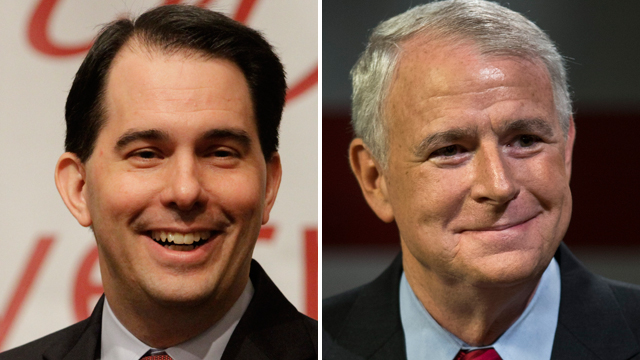A year of explosive legislation, bitter protests, endless campaigning and a prior round of recalls in Wisconsin have led to today.
Republican Gov. Scott Walker, Lt. Gov. Rebecca Kleefisch and four state senators are facing recall votes. It is only the third gubernatorial recall election in American history, and the first ever for Wisconsin.
Walker is widely seen as the likely winner, having benefited from a massive war-chest of more than $30 million, and a firewall of support from national Republicans. But it’s not a done deal: Some last-minute polling suggests late momentum for the Democratic nominee, Milwaukee Mayor Tom Barrett, in a rematch race of their previous face-off during the 2010 Republican wave that helped lift Walker into office.
The catalyst for the uproar that forced the recall was Walker’s legislation stripping most public-sector workers of collective bargaining rights — and the ensuing protests that filled the state Capitol and inspired demonstrations across the country, along with a high-profile effort by the minority Democrats to flee the state and block a three-fifths budget quorum to prevent the bill from moving forward. After Republicans found a way around the roadblock and passed the bill, Democrats initiated the first round of state Senate recalls, which took place in August 2011 and attracted tens of millions of dollars in political spending from both sides.
The results were a mixed bag. Democrats picked up two Senate seats, but were not the one more they needed to deprive Republicans of the majority. Out of the recall campaigns that were waged by both parties, four incumbent Republicans and three Democrats retained their seats, while two Republicans lost to Democratic challengers.
Democrats nonetheless sensed political blood was in the water, and quickly began laying the groundwork for an effort to recall Walker himself — an option that was only possible, under Wisconsin’s recall law, once an elected official has served at least one year of his current term. That effort began in November, and Democrats notched their first major win when they submitted the required signatures to initiate the recall — with a final tally of more than 900,000 signatures verified by state officials. They’d needed 540,208.
The focus then pivoted to finding an actual candidate to take on Walker. Prominent Wisconsin Democrats including David Obey, Herb Kohl and Russ Feingold all passed, making the primary a contest between Barrett, who had the support of most elected officials, and former Dane County Executive Kathleen Falk, who had the support of most labor unions. Barrett won the May 8 primary easily, setting up a rematch with Walker.
Walker has extolled the idea that his reforms to state government are working, and maintained that the state economy is picking up. Barrett, meanwhile, has hammered Walker for the “John Doe” investigation of former aides from when Walker was Milwaukee County executive, for allegedly campaigning on government time, and has lambasted Walker for making himself into a political “rock star” at the expense of the state’s economy.
Walker faced questions at a recent debate over whether he had a secret plan to turn Wisconsin into a “Right To Work” state, rolling back even private-sector unions. Possible plans to push such legislation were revealed in a recently unveiled videotaped conversation from January 2011, in which Walker told a wealthy donor — who wanted right-to-work legislation — that he would “divide and conquer,” starting with his upcoming legislation against public employee unions.
One clear trend in the election, though, has been the extent to which Republicans have eagerly nationalized the race. Walker received help from surrogates throughout the contest, including visits by Louisiana Gov. Bobby Jindal, Virginia Gov. Bob McDonnell, South Carolina Gov. Nikki Haley and others.
Indeed, some liberals prominently grumbled throughout the recall about a lack of national backup.
Barrett did, however, eventually get a late boost from high-wattage Democrats, including campaign appearances by DNC Chairwoman Debbie Wasserman Schultz Democratic Governors Association Chairman Martin O’Malley, and finally a stop from former President Bill Clinton.
Polls close at 8 p.m. Central Time.









